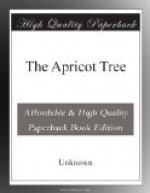“She told me,” continued his grandmother, “that the Apostle alludes to the custom of melting gold and other metals by fire; and his meaning is, that as coals of fire melt and soften the metals on which they are heaped, so by kindness and gentleness we may melt and soften our enemy, and make him love, instead of hating us.”
Ned thanked his grandmother for this explanation, and then was silent for some little time.
“Perhaps,” he said to himself, “if I go on being kind to Tom Andrews, I shall at last make him love me, and leave off teasing me and saying ill-natured things.”
He would not tell his grandmother that he had given Tom part of his dinner, for fear she should another day give him more; and he knew she could not do this without robbing herself.
Tom’s father remained out of work for several weeks; and Tom would have been obliged to go without a dinner most days, if Ned had not regularly given him half his.
For some time Tom received his companion’s kindness sulkily, and without appearing at all grateful; but at last Ned’s good-natured conduct appeared to touch him, and he said—
“How kind you are to me, Ned! though I am sure I have done nothing to deserve kindness from you. Father often says he wishes I was more like you; and I do think I should be happier if I was, for you always seem cheerful and contented, though you work harder than I do.”
“I like working,” answered Ned; “nothing makes me so dull as being idle. Besides, as grandmother says, people are far more likely to do wrong when they are not employed. You know the lines in the hymn,—
’For Satan finds some mischief still
For idle hands to do,’”
Tom looked down and coloured.
Ned, who had not meant to give him pain by what he said, added, on observing Tom’s confusion—
“I have so many things I like to do when I go home after work, that I don’t deserve praise for not being idle.”
“I wish I had anything I liked to do when work is over,” returned Tom; “but I have nothing to do but play, and I soon get tired of that.”
“So do I,” rejoined Ned. “I like a game of ball or cricket every now and then as well as anybody; but it is a great waste of time, to say the least of it, to spend all one’s spare hours in play; besides, as you say, we get tired, and do not enjoy play if we have too much of it.”
“What do you do of an evening, that is so pleasant?” inquired Tom.
“Why I keep our little garden in order;—that takes up a good deal of time; and I write a copy, and do a sum or two, and read the Bible to grandmother.”
“I should like that very well,” observed Tom, “all except reading the Bible.”
“Oh, do not say so!” exclaimed Ned; “surely you do not mean it.”
“I dare say,” rejoined Tom, “that I should like the Bible well enough if I could understand it; but it’s so hard! You understand it all, I suppose?”




